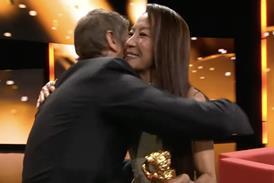Morten Traavik and Sun Kim’s clear-eyed film follows the highs and lows of love across the cultural divide

Dir: Morten Traavik, Sun Kim. Norway/Latvia/South Korea. 2025. 93mins.
Yujin Han runs the South Korean matchmaking agency Lovestorya, which aims to pair up women who have defected from North Korea with South Korean husbands. “They want a stable life,” says Han, who was herself born in North Korea – little wonder given the traumatic experiences most have been through in order to escape Kim Jong Un’s dictatorship. While those stories flow just beneath the surface of Morten Traavik and Sun Kim’s documentary, this is primarily an examination of what happens when romanticism comes up against the everyday reality of relationships, with cultural differences and expectations thrown into the mix.
Foregrounds human relationships rather than politics
Belgium-based Korean American Kim appeared in Norwegian co-director Traavik’s 2012 documentary Liberation Day, which charted the first rock concert in North Korea, by Slovenian band Laibach, and the pair have since struck up a creative partnership involving cultural exchanges between North Korea and Norway. Matchmaking stories have a universal appeal, and North South Man Woman, with its added societal edge, is likely to pair well with audiences looking for an accessible insight into North and South Korea that foregrounds human relationships rather than politics. It played Sarajevo after a world premiere at Sheffield DocFest and further festivals and niche distributors are likely to be attracted by this quirky handling of affairs of the heart.
Traavik and Kim explore the idea of romantic idealism – and the problems that can come with it. Clips from classic 1990s North Korean romantic comedy Urban Girl Comes To Get Married, about a young city sophisticate who falls for a rural farmer, are quirky but less insightful than the wedding photoshoots we see, as photographers coax couples into a series of romantic poses with uncanny-valley results. The quickfire editing from Gatis Belogrudovs and Ugis Olte is initially rather choppy, but thankfully the film calms down to give the participants room to express their opinions. The directors also deserve praise for maintaining an admirable even-handedness towards the men and women involved.
Idealism is present on both sides of the DMZ, with South Korean men describing the North Korean women as being “like fairies”, while the women see the men from the South as the perfect old-school gentlemen. Yujin herself married one of the men who passed through her agency, Yurok Jin. Traavik and Kim follow them over five years, along with Hyoju Han and her husband Jaewu Jeong, and several of the women’s other North Korean female friends.
One strong emerging strand is just how driven the women from the North are to work hard and succeed in comparison with their southern husbands. We repeatedly see Hyoju and Jaewu spar jokingly about their relationship, but it becomes increasingly apparent that Hyoju, like several of the women here, may be regretting the speed with which she made the decision to set up home. Jaewu, for his part, seems permanently surprised by the directness of his wife, though his love for her is also evident.
Yujin, meanwhile, runs a guest-house business in addition to her agency and, because business is slow in the winter, also embarks on a bean paste endeavour. Her husband, by contrast, seems happy to muddle along as a kept man with a YouTube channel – much to Yujin’s increasing frustration. Traavik and Kim help negotiate the film’s tonal shifts – which see the woman recall some of their traumatic experiences – with the addition of cutaways to small models of people, similar in size to those seen on wedding cakes.
These inserts include one in which a female doll is on a rail track as a train barrels past on the neighbouring line, and another that shows a similar doll next to a torrent of water. They add a melancholy air that offsets the humour elsewhere and become even more poignant as the women recall some of their experiences fleeing their homeland or are seen to yell greetings from the shoreline to mothers they may never see again over in the North.
Production companies: Remont Films, VFS Films, Mirror & Story
International sales: Dogwoof, katie@dogwoof.com
Producers: Verona Meier, Anna Krasztev-Kovacs
Cinematography: Janis Senbergs, Valdis Celmins
Editing: Gatis Belogrudovs, Ugis Olte
Music: Eric Vapnargard
























